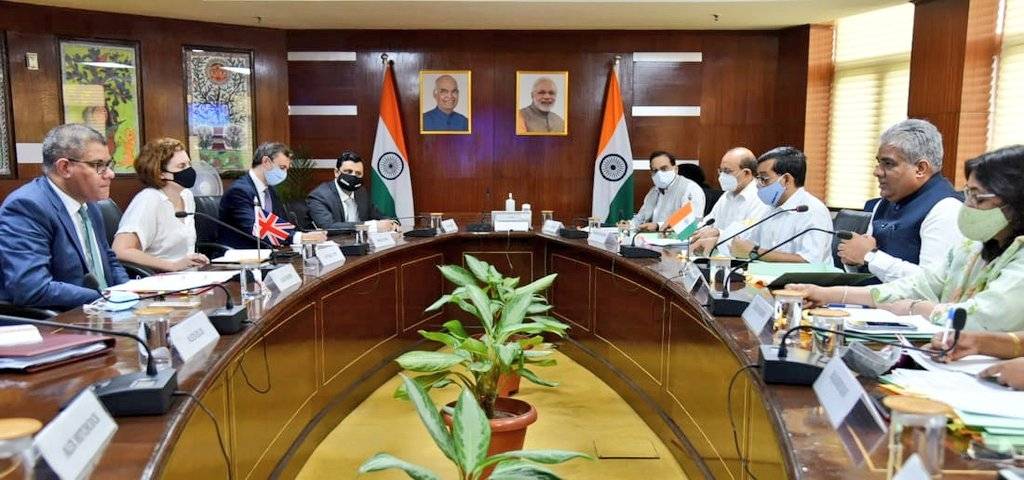He also conveyed India’s position that COP26 should ensure a balanced outcome with equal treatment to agenda items such as adaptation, finance and technology transfer.”…reports Asian Lite News.
India on Wednesday extended full support to the UK for the annual climate change summit to be held at Glasgow in November this year, but reiterated its position that COP26 should ensure a balanced outcome with equal treatment to agenda items such as adaptation, finance and technology transfer.
Ahead of the annual climate summit COP26 or the Conference of Parties (COP) under the United Nations Framework Convention on Climate Change (UNFCCC) to be held in Glasgow in November, its President-designate Alok Sharma from the UK was on a short India trip.
On the last day of his visit, Sharma met Finance Minister Nirmala Sitharaman and Environment Minister Bhupender Yadav apart from speaking at the Confederation of Indian Industry’s (CII) National Council Session. He also launched the GreenCellM, an e-bus.
Yadav and Sharma discussed issues relating to climate change, COP26, India-UK 2030 Roadmap, and other related matters.
“India believes that climate actions must be nationally determined and it strongly advocates that the differentiation and operationalisation of flexibility provided in the UNFCCC and the Paris Agreement for developing countries should be at the core of decision-making,” emphasised Yadav, reiterating Prime Minister Narendra Modi’s focus on climate justice while fighting climate change.
Yadav also informed the UK delegation about the remarkable feat India has achieved in decoupling growth from emission intensity, demonstrating ambitious actions in renewable energy, energy efficiency and rise of green cover, an official said, adding, “He also conveyed India’s position that COP26 should ensure a balanced outcome with equal treatment to agenda items such as adaptation, finance and technology transfer.”
Sharma and his team were informed about the global initiatives spearheaded by India under Modi’s leadership for tackling climate change such as Leadership Group for Industry Transition (LeadIT), Coalition on Coalition Disaster Resilient Infrastructure (CDRI) and International Solar Alliance (ISA), a government release said.
Reminding that India is among a few G20 countries on track towards UNFCCC and Paris Agreement goals and has taken decisive actions to tackle climate change, Sitharaman mentioned that India is taking concrete steps at appreciable speed to meet its commitments on the target of 450GW of renewable energy by 2030.
“Of these, 100 GW has already been achieved,” she said.
The Finance Minister also highlighted the extensive work done on the Hydrogen Energy Mission.
Sitharaman expressed hope that the commitment made by the developed countries to provide $100 billion per year to developing countries would be achieved, and sounded optimistic about a positive outcome on the new collective goals on finance in COP26.
A release from the British High Commission quoted Sharma as saying: “I leave India hopeful. I’ve had a set of very constructive discussions with ministers here and I am incredibly encouraged by the visionary speech Prime Minister Modi made on Independence Day, in particular the reference to renewables and green hydrogen.”
Claiming that countries need to be more ambitious in emission reduction targets and in accelerating the transition from coal to clean energy, Sharma said, “I’ve requested that the Indian government considers whether as part of any revised NDC, that overachievement is taken into account as well as a really ambitious plan for pushing forward on all of this.”
“When the UK took on the COP26 Presidency, less than 30 per cent of the global economy was covered by a net zero target — we’re now at 70 per cent,” he said.
COP26 is a crucial meeting in view of the Paris Agreement that India has signed along with scores of other nations.
The Paris Agreement is a global effort to cut emissions to restrict the temperature rise to 2-degree Celsius and if possible, to keep it at 1.5-degree Celsius, as compared to the pre-industrial era.
A recent Intergovernmental Panel on Climate Change (IPCC) report has already warned of dire consequences in terms of increasing heat waves, erratic precipitation and sea level rise among other extremities for India and other nations.
ALSO READ-COP26 President-designate to meet Environment Minister Yadav
READ MORE-Sharma to don dual role as Business Secretary and President – COP 26

Leave a Reply